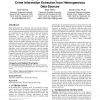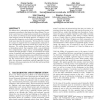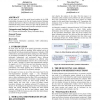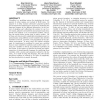115
click to vote
DGO
2008
15 years 3 months ago
2008
This paper provides an interim report on ongoing data collection and analysis efforts as part of a large-scale study of information technology- focused interagency collaborations ...
118
click to vote
DGO
2008
15 years 3 months ago
2008
Many scholars believe that electronic rulemaking has great but largely untapped potential to expand the public's democratic input and improve federal agency regulatory rules....
107
click to vote
DGO
2008
15 years 3 months ago
2008
Much information that could help solve and prevent crimes is never gathered because the reporting methods available to citizens and law enforcement personnel are not optimal. Dete...
111
click to vote
DGO
2008
15 years 3 months ago
2008
We address the e-rulemaking problem of categorizing public comments according to the issues that they address. In contrast to previous text categorization research in e-rulemaking...
140
click to vote
DGO
2008
15 years 3 months ago
2008
We are developing an automated crime reporting and investigative interview system. The system incorporates cognitive interview techniques to maximize witness memory recall, and in...
113
click to vote
DGO
2008
15 years 3 months ago
2008
Supporting public participation is often a key goal in the design of digital government systems. However, years of work may be required before a complex system, such as the UrbanS...
DGO
2008
15 years 3 months ago
2008
101
click to vote
DGO
2008
15 years 3 months ago
2008
In this paper we outline an approach for modeling election processes and then performing rigorous analysis to verify that these process models meet selected behavioral requirement...
127
click to vote
DGO
2008
15 years 3 months ago
2008
UrbanSim is a modeling system for simulating the development of urban regions over periods of 20-30 years. Its purpose is to help evaluate alternative proposed policies and transp...




